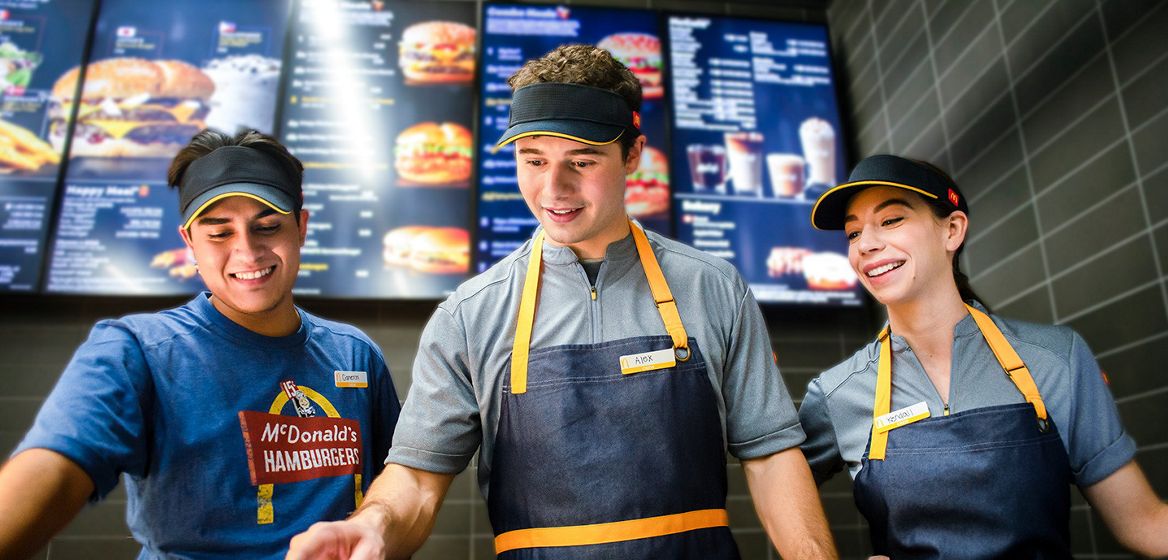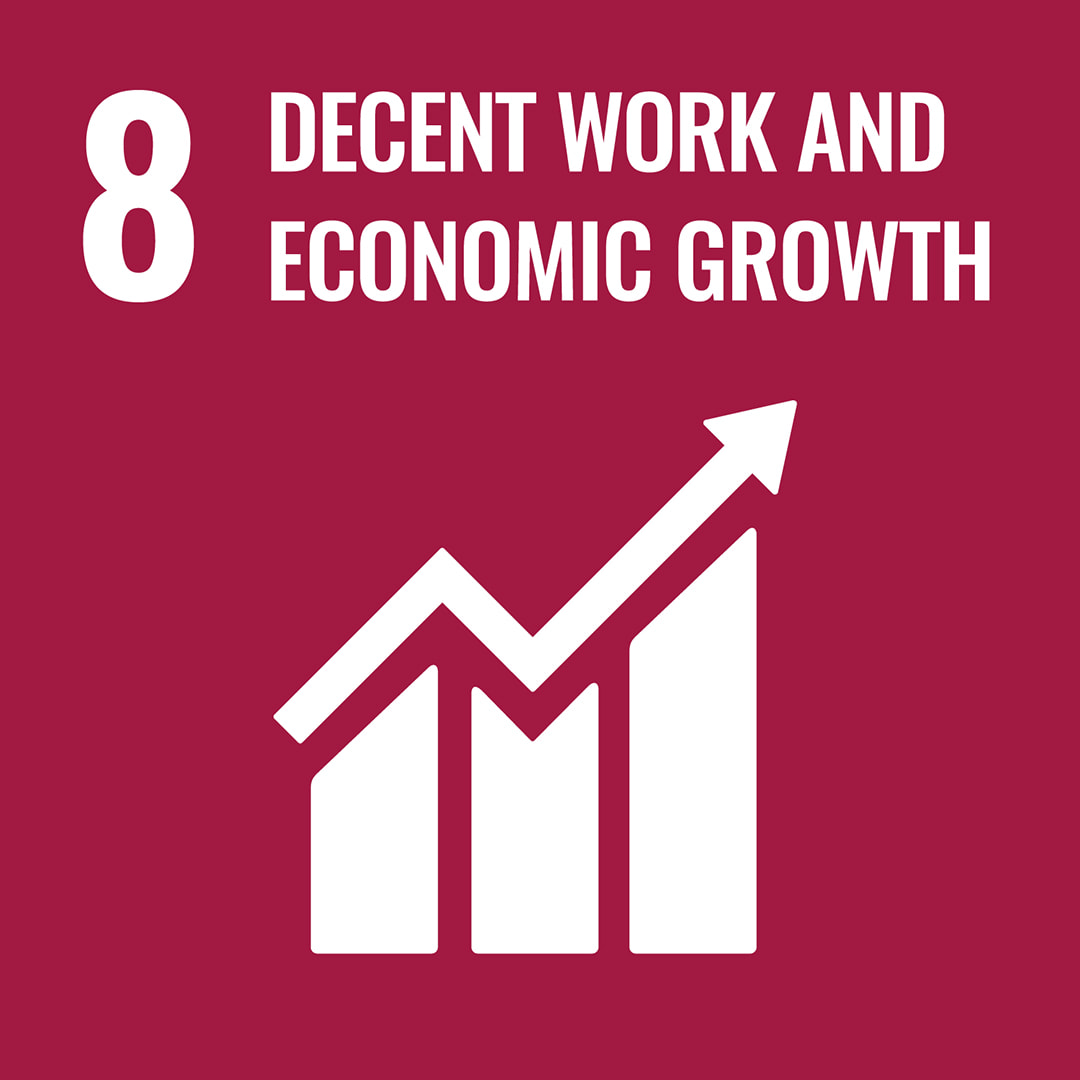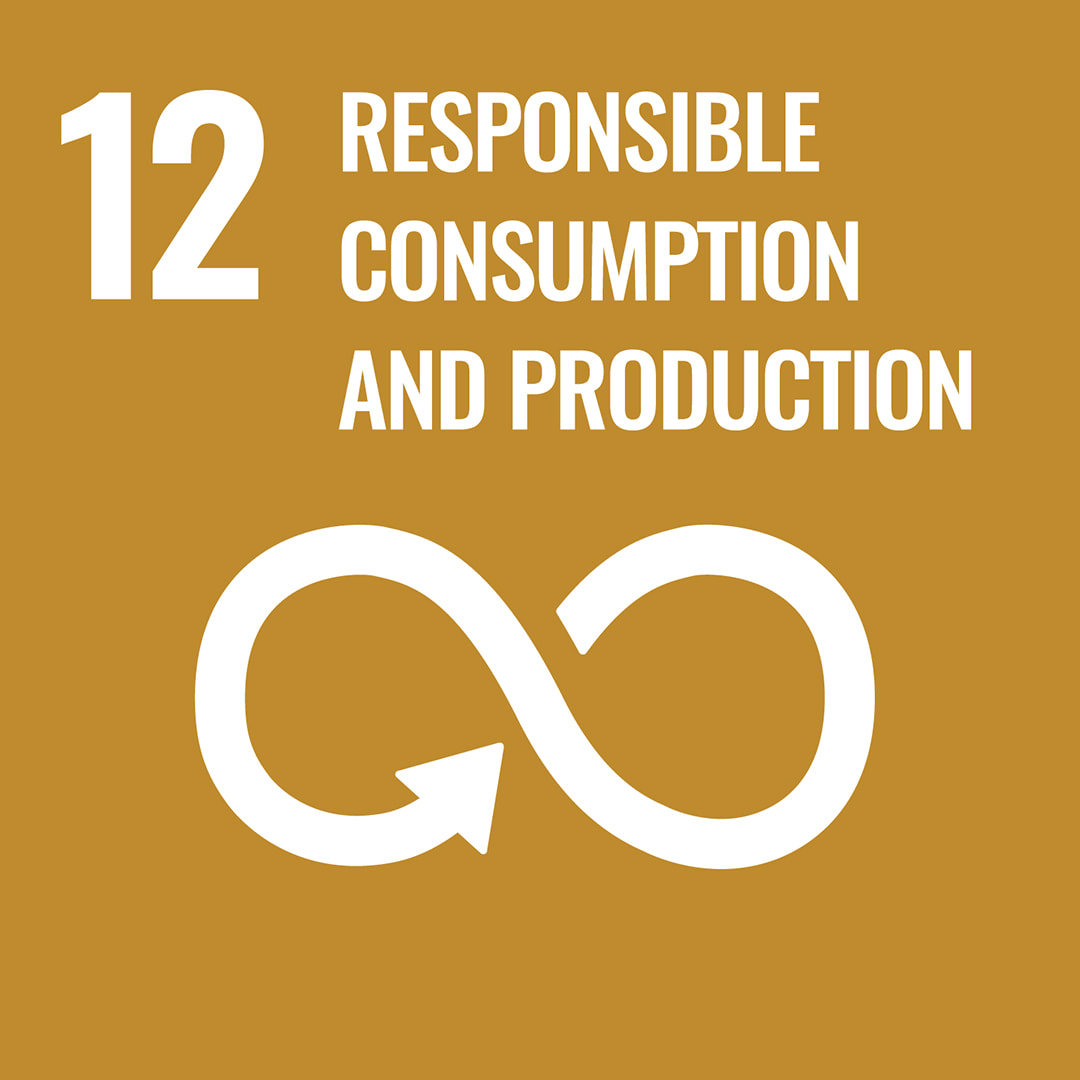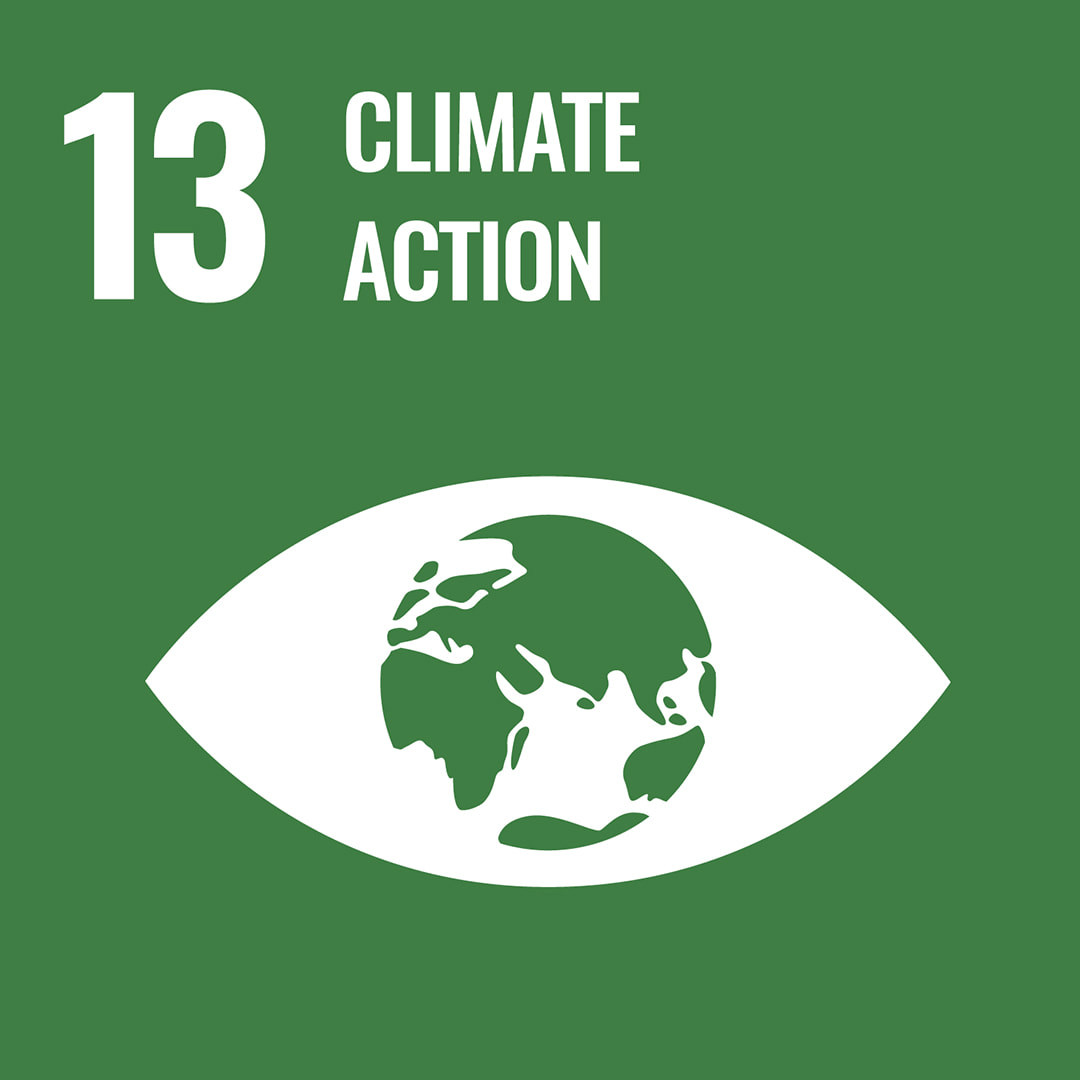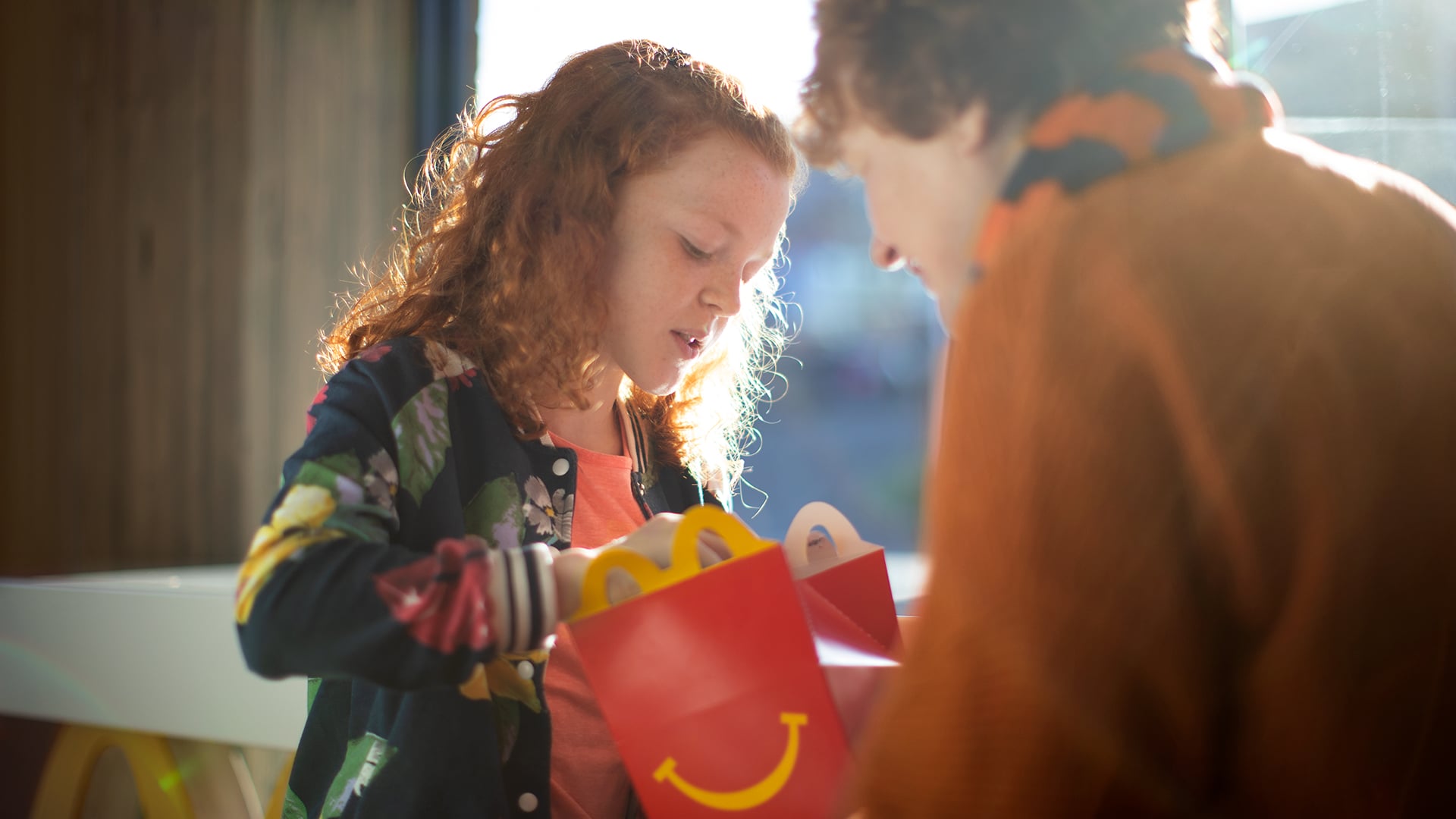Contributing to the UN Sustainable Development Goals
We believe much of what we, our Franchisees and our suppliers do has the potential to contribute to sustainable development.
The United Nations Sustainable Development Goals (SDGs) is a global agenda established in 2015, with the objective to end poverty, protect the planet and ensure prosperity for all. We are proud to support this call to action and, through our work, we believe we are directly and indirectly contributing progress toward these objectives.1
This page focuses on the selection of SDGs, and the targets that underpin them, that are most related to our business and Impact Areas.
- SDG 4: Ensure inclusive and equitable quality education and promote lifelong learning opportunities for all
- SDG 8: Promote sustained, inclusive and sustainable economic growth, full and productive employment and decent work for all
- SDG 12: Ensure sustainable consumption and production patterns
- SDG 13: Take urgent action to combat climate change and its impacts
Examples of our Work
The Global Context
Disparities in access to education, technical and vocational skills development, and decent jobs persist around the world.
We believe that the role of organizations to promote and provide equitable learning opportunities is vital. The Company, together with its Franchisees, sees education as a necessary tool to support and empower our respective employees, enabling us to foster a culture of lifelong learning.
Find out more about SDG 4 on the UN SDGs website.
The Most Relevant UN SDG 4 Target to Our Business
SDG Target 4.4: By 2030, substantially increase the number of youth and adults who have relevant skills, including technical and vocational skills, for employment, decent jobs and entrepreneurship
What McDonald’s Is Doing
Our Signature Learning Approach
We believe opportunity starts with education. That is why we’re committed to offering equitable access to opportunity so that McDonald’s Company-owned and operated restaurant employees, as well as Franchisees and eligible employees from their organizations, feel empowered to reach their potential.
Hamburger University (HU) is the Company’s signature learning and development approach. Since first opening in Illinois in 1961, HU has grown to have nine campuses globally as of 2023. It provides training for Company employees, as well as for Franchisees and their employees, 2 and has helped prepare thousands of people for leadership positions in the McDonald’s System.
Our Corporate Staff
Our Corporate Staff work daily to help make a positive impact on the Company’s business, people and communities. In turn, the Company is committed to their professional development and to supporting Corporate Staff as they pursue their career paths.
The Company wants Corporate Staff to have a meaningful and impactful career at McDonald’s, and offers robust opportunities to help them develop professionally, explore career-related interests and aspirations and navigate their careers. The Company’s ambition is to create a place where people can work, develop, mentor and lead alongside other top talent. To help shape career paths for certain Corporate Staff, we offer the opportunity for some individuals to participate in leadership development programs such as “Inspire” or “Elevate.” These are delivered through a series of workshops and are designed to help develop new and existing people leaders.
Restaurant Staff
McDonald’s offers avenues for learning to its Restaurant Staff and encourages our Franchisees to do the same. Archways to Opportunity®, for example, is a comprehensive education strategy that includes offering eligible Restaurant Staff employees at participating restaurants in the U.S. access to programs that provide access to opportunities to grow and learn – whether that means graduating from high school or college, learning English as a second language or obtaining access to academic or career advisors.
As of year-end 2023, the program had:
- Awarded over $200 million in tuition assistance to Restaurant Staff.
- Awarded tuition assistance to more than 65,000 Restaurant Staff.
- Supported nearly 2,000 graduates of the Career Online high school program.
- Supported more than 8,800 graduates of English Under the Arches program.
Reducing Barriers to Employment for Young People
In 2018, the Company set a goal of reducing barriers to employment for 2 million young people by the end of 2025. The Youth Opportunity program, in collaboration with the International Youth Foundation (IYF), aims to help participants overcome barriers through preemployment job readiness training, employment opportunities and workplace development programs.
We surpassed this goal ahead of our target year, with 2.2 million young people having participated in training programs and/or employment opportunities in Company-owned and operated or participating Franchisee restaurants by the end of 2023.3
We recognize many populations face barriers to employment around the world, including but not limited to youth, refugees, senior citizens and people with disabilities. As we look to the future, we will assess potential new opportunities to build on the opportunity employment progress we have made so far.
Learn more about what the Company is doing to promote equitable learning opportunities on our Goal Performance & Reporting page.
The Global Context
We believe that collaborative efforts are needed to help drive sustained and inclusive economic growth, create employment and improve living standards.
Company employees, which include those in the Company’s corporate and other offices as well as in Company-owned and operated restaurants, totaled over 150,000 worldwide as of year-end 2023. The over 2 million individuals who work in McDonald’s franchised restaurants around the world are critical to the Company’s success, enabling it to drive long-term value creation and further its purpose and mission.
We believe our scale and reach present opportunities to contribute to full and productive employment and decent work around the world. This includes having human rights policies and standards in place across our supply chain and restaurants – both Company-owned and operated and franchised. Building from that, we provide competitive compensation to Corporate Staff and Company-owned and operated restaurant employees and help reduce barriers to employment for young people.
Find out more about SDG 8 on the UN SDGs website.
The Most Relevant SDG 8 Targets to Our Business
SDG Target 8.5: By 2030, achieve full and productive employment and decent work for all women and men, including for young people and persons with disabilities, and equal pay for work of equal value
SDG Target 8.8: Protect labour rights and promote safe and secure working environments for all workers, including migrant workers, in particular women migrants and those in precarious employment
What McDonald’s Is Doing
Diversity, Equity and Inclusion
When we actively foster an inclusive environment where diversity is embraced as a business advantage, we believe that we have the power to make a positive difference. The Company is dedicated to making a bias-aware, inclusive workplace that enhances and supports a diverse talent pipeline. For more detail, including definitions and goals, see our Diversity, Equity & Inclusion page and Goal Performance & Reporting page.
In recent years, we have expanded our efforts to provide leaders with a roadmap for the role they play in talent engagement and career development. Included in this is a growing focus on driving inclusive leadership, which we support through training courses that enable leaders to be more accountable in their responsibility to take an inclusive approach to talent development.
We are also advancing our succession planning approach, setting it as a core tenet of talent development and a lever for keeping leaders engaged in our broader inclusion-related objectives. The establishment of immediate and long-term succession plans helps to ensure business continuity, strong, diverse future leadership and readiness for career growth.
Respecting Human Rights
We strive to weave human rights into McDonald’s day-to-day practices, helping us fulfill our commitment to respect the rights of all people and communities who produce, serve and enjoy our food. Our commitment to respect human rights is set out in our Human Rights Policy (PDF – 120 KB). The policy is in line with the United Nations Guiding Principles on Business and Human Rights (UNGPs).
Preventing Forced Labor
McDonald’s takes steps to ensure it does not engage in human trafficking or exploitation and works diligently to prevent the importation of goods tainted by slavery or human trafficking. This includes conducting heightened human rights due diligence in geographies determined to be higher risk. The Company has a policy against using any form of slave, forced, bonded or indentured labor.
Fundamental to our Supplier Code of Conduct is an expectation of ethical employment practices by our suppliers and their supply chains, including subcontractors and third-party labor agencies. Our Code and Supplier Workplace Standards and Guidance Document (SWSGD) clearly prohibit any form of slave, forced, bonded, indentured or prison labor, and prohibits suppliers and third-party labor agencies from retaining employees’ government-issued identification, passports or work permits as a condition of employment.
Safe & Respectful Workplaces
We are committed to prioritizing safety in all the Company’s corporate offices and Company-owned and operated restaurants, as well as supporting our Franchisees to do the same in the restaurants they own and operate. We work to foster respectful workplaces, where people can be themselves without fear of harassment, discrimination, retaliation or violence, and help our Franchisees do the same in their workplaces.
The purpose of McDonald’s Global Brand Standards is to promote safe, respectful and inclusive workplaces that help protect the physical and psychological safety of all people. The standards apply across all McDonald’s restaurants (whether Company-owned and operated or franchised) – more than 41,000 locations as of year-end 2023.
In 2021, the Company supplemented existing respectful workplace training with a global eLearning module, “Building a Safe, Respectful and Inclusive Workplace.” This training is available in multiple languages and offered optionally to Franchisees to help them meet Global Brand Standards requirements. We also offer a suite of workplace violence prevention trainings to Franchisees. In 2023, we updated the training requirements for markets outside the U.S. to require employees to complete training within 30 days of their first shift.
Compensation and Pay
To attract and retain talent at all levels of the Company, we provide competitive compensation commensurate with an employee’s position. During 2023, we designed and proposed a third-party wage advisory service to be piloted with a group of U.S.-based Franchisees beginning in early 2024. The optional wage advisory service is a Company investment designed to provide U.S.-based Franchisees with resources and education to help them make third-party-supported wage and compensation decisions for their own businesses based on benchmarking of locally available data.
We also prioritize equal pay for equal work through our goal to close pay gaps identified in annual equal pay analyses for women globally in Company-owned and operated restaurants and for Underrepresented Groups4 in the U.S. at Corporate Staff and Company-owned and operated restaurant levels.
Youth Opportunity
By helping to increase the number of youth and adults who have relevant skills for employment (SDG 4), our Youth Opportunity program helped offer opportunities to have a decent job (SDG 8). As of December 2023, we have achieved our Youth Opportunity goal ahead of our target year. As of the end of 2023, 2.2 million young people have participated in training programs and/or employment opportunities in McDonald’s or participating Franchisee restaurants.3
The Global Context
The rise in global consumption and production associated with economic and social progress can negatively impact the natural systems on which we depend. We understand the significant opportunity and responsibility there is to use materials and natural resources efficiently – from sourcing and design to end-of-life management of everything we use to serve our customers. We focus on a circular economy approach and seek to apply it to areas across our business, from guest packaging to restaurant design.
Promoting circularity is not a challenge we can tackle alone. To help drive the scale and impact of a circular economy approach to guest packaging and waste, we are engaging with external and internal stakeholders such as peer companies, nongovernmental organizations (NGOs), policymakers, academics, Franchisees, suppliers, customers and restaurant crew. We also share learnings with policymakers from the Company’s experience of its restaurants and supply chain to help foster evidence-based policymaking.
Find out more about SDG 12 on the UN SDGs website.
The Most Relevant SDG 12 Targets to Our Business
SDG Target 12.2: By 2030, achieve the sustainable management and efficient use of natural resources
SDG Target 12.5: By 2030, substantially reduce waste generation through prevention, reduction, recycling and reuse
What McDonald’s Is Doing
Packaging and Waste Strategy
Our packaging, toys and waste strategies are designed to help keep communities clean, help protect the planet for future generations and support the Company’s long-term business resilience. To achieve this, we’re evolving our packaging – redesigning some of our most iconic products to eliminate unnecessary packaging, identifying alternative materials and increasing opportunities for recovery.
We’re committed to taking steps to help reduce waste and advance a circular economy. For example, we’re investing in strategies and working collaboratively with other stakeholders to help address systemic challenges related to recycling infrastructure, demand for recycled materials and development of new packaging and toy materials. We continue to evaluate and consider the role reusables can play in our restaurants around the world, alongside other circularity solutions and in compliance with applicable laws regarding reusable packaging.
Partnerships for Sustainability
We co-founded the Global Roundtable for Sustainable Beef and helped establish the European Roundtable for Beef Sustainability.
We are also driving progress toward sustainable consumption and production in other priority areas of our supply chain through targeted activities and policies that can help drive lasting, meaningful outcomes. New partnerships for 2023 include:
- Joining the Canada Plastic Pact, which unites partners behind a vision of creating a circular economy.
- Joining The Recycling Partnership’s Polypropylene Coalition in the U.S. We have committed to a direct contribution of $3 million from 2023–2025 toward the goals of the Coalition, and to increasing recycling of polypropylene.
Circular Economy
The Company’s Global Food Disposition Policy aims to help ensure, as much as possible, that safe and quality food doesn’t go to waste, with surplus instead being redirected to help feed people and communities. We work with restaurants (both Company and Franchisee owned/operated) and our supply chain to donate meals and excess ingredients to families in need. McDonald’s has developed guidelines to reduce supply chain food waste using a hierarchy adapted from the U.S. Environmental Protection Agency’s Food Recovery Hierarchy. In 2023, McDonald’s USA and its suppliers in the U.S. donated over 1.5 million pounds of food and paper combined from suppliers and distribution centers – worth more than $4.6 million – to support local U.S. food banks and communities.
We look to implement various tools to help drive progress on our global commitments and advance a more circular economy. This includes improving material recycling and repurposing rates for guest packaging – making it easier for customers to recycle it where infrastructure exists and reducing the amount of guest packaging-related waste coming from our restaurants.
- By the end of 2023, we were approximately 86.7% of the way toward our goal of sourcing 100% of our primary guest packaging from renewable, recycled or certified materials.5, 6
- From 2018–2023, we reduced virgin fossil fuel-based plastic in Happy Meal toys by 63.7%.
- In 2023, approximately 88.3% of restaurants in markets with advanced infrastructure7 offered guests the opportunity to recycle and/or compost packaging items. In these restaurants, guest packaging is collected in customer-facing bins for back-of-house or off-site sorting for recycling or composting, utilizing existing local waste infrastructure systems.
Learn more about what the Company is doing to help promote a circular economy on our Goal Performance & Reporting page
The Global Context
The 2015 Paris Agreement sought to strengthen the global response to climate change by limiting global temperature rises to 1.5°C above pre-industrial levels.
We believe we have a responsibility to be part of the solution to this global issue. We are embracing the unique opportunity we have – as a brand of global scale – to mobilize the entire McDonald’s System to act now and be a catalyst of change across the world. Climate change has the potential to pose risks to the resilience of our food supply and to the communities where we source and operate.
Find out more about SDG 13 on the UN SDGs website.
The Most Relevant SDG 13 Targets to Our Business
SDG Target 13.2: Integrate climate change measures into national policies, strategies and planning
What McDonald’s Is Doing
Reducing Our Emissions
In 2018, we set targets, approved by the SBTi, to reduce GHG emissions in line with a 2˚C warming scenario. Since then, as science has evolved, so have our targets. In 2023, the SBTi validated our global 2050 net zero emissions reduction target and our adjusted 2030 global emissions targets, aligned with the latest guidance to help keep global temperature rises below 1.5°C.8
By the end of 2030, from a 2018 base year, McDonald’s commits to reduce:
- Absolute Scope 1 and 2 GHG emissions by 50.4% from Company-owned and operated restaurants and offices.
- Absolute Scope 3 energy and industrial GHG emissions by 50.4% from Franchisee and Company-owned and operated restaurants, and the facility, logistics and plastic packaging emissions in our supply chain.
- Absolute Scope 3 Forest, Land and Agriculture (FLAG) GHG emissions by 16% and to maintain no deforestation across its primary deforestation-linked commodities.
Decarbonizing Our Supply Chain
Our ability to measure and achieve reductions in overall GHG emissions – particularly our Scope 3 emissions – depends significantly on the work and collaboration of our suppliers. We require our global beef and chicken suppliers to commit to setting science-based targets validated by the SBTi. We are currently supporting dairy and cheese suppliers to do the same, or to set equally ambitious third-party-certified targets. Additionally, as of 2023, our independent logistics suppliers have set SBTi-approved science-based targets.
Through our climate data and insights platform, we model the various impacts suppliers and sourcing categories have on our emissions. These insights allow us to target our work with suppliers on strategies that support our science-based targets and reduce our collective climate impact.
We believe in the power of sustainable agriculture practices to help increase biodiversity, enrich soils and boost climate resilience. We look to scale the adoption of regenerative agriculture principles by our suppliers to help build more resilient supply chains and drive action against our climate goals.
Learn more about the Company’s Climate Action on our Goal Performance & Reporting page.
Footnotes
1 The content of this publication has not been approved by the United Nations and does not reflect the views of the United Nations or its officials or Member States.
2 Franchisees are independent employers and select which of their employees attend Hamburger University.
3 This figure is based on actual and, in some cases, extrapolated hiring data for the following participating markets: Argentina, Australia, Brazil, Canada, China, Colombia, Hong Kong, Italy, Japan, Jordan, Korea, Mexico, NE India, Portugal, Spain, Switzerland, the U.K. and the U.S. McDonald’s collects data from McOpCo and participating Franchisees, but extrapolates where it does not have access to the underlying data globally. Additional markets that provide training data include Argentina, Austria, Brazil, Colombia, Denmark, France, Germany, Italy, Jordan, Mexico, NE India, the Netherlands, Panama, Switzerland, the U.K. and the U.S.
4 In the U.S., the term “Underrepresented Groups” generally means people who identify as Black, Indigenous, Asian or Pacific Islander, or otherwise as people of color, people of Hispanic or Latino/a/x descent, people with disabilities, people who identify as LGBTQ+, people from religious minorities, or people having a combination of these identities or attributes. For purposes of McDonald’s reporting, including with respect to Human Capital Metrics and Equal Pay, “Underrepresented Groups” is defined as people who identify as Black, Indigenous, Asian or Pacific Islander, people of Hispanic or Latino/a/x descent, or people having a combination of these identities or attributes.
5 Packaging. Scope: Inclusive of all markets for our fiber-based packaging and Happy Meal book and toy packaging. For our plastic-based packaging, all markets are included except for Israel, Latin America and Turkey. Renewable sources refers to material that is composed of biomass from a living source and that can be continually replenished. Renewable applies to plastics only, not fiber. Source: ISO 14021:2016 for plastic, ASTM 6866 or ISO 16620-2. Fiber-based packaging made from 100% recycled sources must be third-party verified, unless certified under a Chain of Custody Forest Management standard. McDonald’s requires all wood fiber sourced from Argentina, Cambodia, China, Indonesia, Laos, Malaysia, Russia and Vietnam to be Forest Stewardship Council® (FSC®) certified or FSC® controlled wood sources with full chain of custody certification. Perfluorinated compounds are known to be historically persistent in the environment. McDonald’s commits to not intentionally adding fluorinated compounds through our processes, but fluorinated compounds present in the local environment make it difficult to remove all traces of fluorine from packaging. Please refer to our Nature, Forests & Water page for additional definitions. Exclusions: Primary fiber-based packaging in food packaged off-site of McDonald’s restaurants, tray liners and limited locally sourced items.
6 Non-structural components of packaging vary based on the packaging but may include adhesives, inks, overprint varnishes, retention agents or binders, processing aids, impact modifiers, and nucleating and clarifying agents. We continue to monitor industry standards on these components and opportunities to work toward making any part of our packaging, including non-structural components, more sustainable.
7 Markets with advanced infrastructure: Mature waste and recycling infrastructure at a national level that has (1) recycling infrastructure network across the entire market, (2) multiple materials being recycled within this national infrastructure network, (3) existing legislation on recycling and (4) high customer awareness of waste and recycling. At the end of 2023, that included 21 markets where McDonald’s operates.
8 McDonald’s SBTi-validated target in full:
- McDonald’s Corporation commits to reduce absolute Scope 1 and 2 GHG emissions 50.4% by 2030 from a 2018 base year.
- McDonald’s Corporation also commits to reduce absolute Scope 3 energy and industrial GHG emissions from purchased goods and services, fuel and energy- related activities, upstream transportation and distribution, waste generated in operations, end-of-life treatment of sold products, and franchises 50.4% within the same timeframe.
- McDonald’s Corporation commits to reduce absolute Scope 3 FLAG GHG emissions 16% by 2030 from a 2018 base year. McDonald’s Corporation also commits to maintain no deforestation across its primary deforestation-linked commodities.

